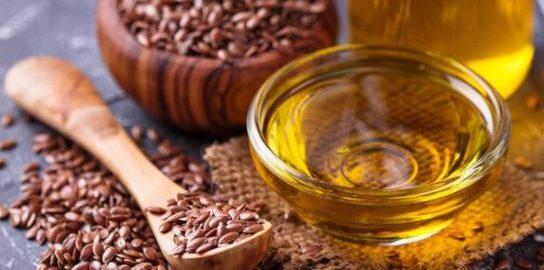
Omega 3 Vegetable Oil (Flax Seed Oil) – Linum usitatissimum oil
Flax seeds contain high levels of dietary fiber including lignans, an abundance of micronutrients and omega-3 fatty acids (table). Flax seeds may lower cholesterol levels, especially in women. Initial studies suggest that flax seeds taken in the diet may benefit individuals with certain types of breast and prostate cancers. A study done at Duke suggests that flaxseed may stunt the growth of prostate tumors, although a meta-analysis found the evidence on this point to be inconclusive. Flax may also lessen the severity of diabetes by stabilizing blood-sugar levels. There is some support for the use of flax seed as a laxative due to its dietary fiber content though excessive consumption without liquid can result in
intestinal blockage. Consuming large amounts of flax seed may impair the effectiveness of certain oral medications, due to its fiber content, and may have adverse effect due to its content of neurotoxic cyanogen glycosides and immuno-suppressive cyclic nonapeptides.
Flaxseed and its derivative flaxseed oil/linseed oil are rich sources of the essential fatty acid alpha-linolenic acid, which is a biologic precursor to omega-3 fatty acids such as eicosapentaenoic acid. Although omega-3 fatty acids have been associated with improved cardiovascular outcomes, evidence from human trials is mixed regarding the efficacy of flaxseed products for coronary artery disease or hyperlipidemia.
The lignan constituents of flaxseed (not flaxseed oil) possesses in vitro anti-oxidant and possible estrogen receptor agonist/antagonist properties, prompting theories of efficacy for the treatment of breast cancer. However, there is not sufficient human evidence to make a recommendation. As a source of fiber mucilage, oral flaxseed (not flaxseed oil) may possess laxative properties, although only one human trial has been conducted for this indication. In large doses, or when taken with inadequate water, flaxseed may precipitate bowel obstruction via a mass effect. The effects of flaxseed on blood glucose levels are not clear, although hyperglycemic effects have been reported in one case series.
Flaxseed oil contains only the alpha-linolenic acid component of flaxseed, and not the fiber or lignan components. Therefore, flaxseed oil may share the purported lipid-lowering properties of flaxseed, but not the proposed laxative or anti-cancer abilities.
It is aromatic and considered soothing for the stomach, useful as a laxative, and good for health.
Heart disease
People who have had a heart attack are reported to benefit from diets rich in alpha-linolenic acid, which is found in flaxseed. Good studies that examine the effect of flaxseed on heart disease in humans are not available. It is unclear whether flaxseed supplementation alters the course of heart disease.
High cholesterol or triglycerides
In laboratory and animal studies, flaxseed and flaxseed oil are reported to lower blood cholesterol levels. Effects on blood triglyceride levels in animals are unclear, with increased levels in some research, and decreased levels in other research.
Human studies in this area report mixed results, with decreased blood levels of total cholesterol and low-density lipoprotein (“bad cholesterol”) in some studies, but no effect in other studies. Most human research has not been well-designed, and further research is needed before a recommendation can be made.
| Omega 3 Vegetable Oil (Flax Seed Oil) | |||
| Flax Seed Oil % | 100% | ||
| Parameter | Units | AOCS Method | Limits |
| Physical Characteristics | |||
| Colour | Yellowish Liquid | ||
| Odour | Peculiar Odour | ||
| Taste | Bland / Disagreeable Taste | ||
| Boiling Point (ºC) | Deg C | AOCS Ca 2b-38 | >316 |
| Melting Point (ºC) | Deg C | AOCS Cc 3 -25 | -24 |
| Specific Gravity | AOCS Cc 10a-25 | 0.925 – 0.935 | |
| Refractive Index @ 40º C | AOCS Tp 1a-64 | 1.4725 – 1.4750 | |
| Chemical Characteristics | |||
| Acid Value | % Oleic Acid | AOCS Da 14-48 | 1.0 – 3.5 |
| Saponification Value | mg/G KOH | AOCS Cd 3b-76 | 187 – 195 |
| Iodine Value | AOCS Tg 1a-64 | > 175 | |
| Unsaponified Matter | 1.5% Max | ||
| Free Fatty Acid | % Oleic Acid | AOCS Ca 5a – 40 | 0.5% Max |
| Per_Oxide Value | meq | AOCS Ja 8 – 87 | 4 max |
| Fatty Acid Profile | |||
| Total unsaturated Fatty Acid | 0.88 | ||
| Total PUFA | AOCS Ce 1i – 07 | 0.7 | |
| Omega 6 | 0.15 | ||
| Omega 3 | 0.56 | ||
| Omega 6/Omega 3 | Ratio | 0.27 | |
| C 16: 0 Palmitic | % age | 4 – 6 | |
| C 18: 0 Stearic | % age | 2 – 5 | |
| C 18: 1 Oleic | % age | 15 – 20 | |
| C 18: 2 Linolenic (Omega-6) | % age | 15 – 18 | |
| C 18: 3 α-Linoleic (Omega-3) | % age | 55 – 60 | |
| Minor Components | % age | 0 – 1 | |
| Trans Fat | AOCS Ce 1f – 96 | Nil | |
| Cholesterol | mg/Kg | Nil | |
| Microbiological Characteristics | |||
| Aerobic Plate Count | cfu per gm | AOAC 990.12 | 1000 Max |
| Yeast & Mold | cfu per gm | BAM 19.01-19.03 | 50 Max |
| Total Coliforms | AOAC 991.14 | Negative | |
| E. Coli | AOAC 991.14 | Negative | |
| Salmonella | BAM 7.01-7.17 | Negative | |
| C.P.Staphylococcus | BAM 14.01 – 14.03 | Negative | |

